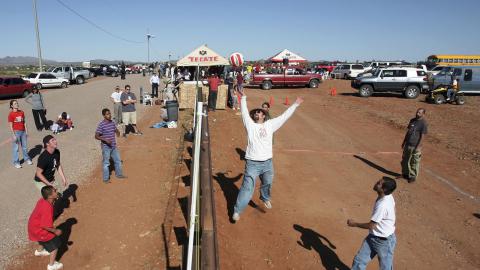- America Has Freaked Out Over Birthright Citizenship For Centuries – Gabriel J. Chin (Talking Points Memo)
- Who Won Science Fiction’s Hugo Awards, and Why It Matters – Amy Wallace (Wired)
- After a Year of High-Profile Killings by Police, Americans' Views on Race Have Shifted – David Lauter and Matt Pearce (Los Angeles Times)
- Iran Deal Ads Running in at Least 23 States, Including Florida, Texas, California and Pennsylvania – Catherine Ho (Washington Post)
- Locals Are Using the US-Mexico Border Fence as a Giant Volleyball Net – Jake Flanagin (Quartz)
America Has Freaked Out Over Birthright Citizenship For Centuries
By Gabriel J. Chin
August 20, 2015
Talking Points Memo
The controversy over whether children of undocumented migrants should be citizens may be heating up now, but it’s just the latest in a string of similar moments in U.S. history. The citizenship status of every non-white racial group has been challenged for literally centuries.
In the earliest days of the Republic, as the Supreme Court and other courts recognized, U.S. citizenship was granted by unwritten law. As a “common law” legal principle, in general, children born in the United States were citizens. However, because the rule was unwritten, its precise contours were debatable. The Supreme Court’s notorious Dred Scott case, decided in 1857, turned on the majority’s conclusion that a person of African ancestry was not a U.S. citizen, even though born here. The Court essentially found an unwritten exception to the unwritten law—namely, that it benefited only whites.
Who Won Science Fiction’s Hugo Awards, and Why It Matters
By Amy Wallace
August 23, 2015
Wired
Since 1953, to be nominated for a Hugo Award, among the highest honors in science fiction and fantasy writing, has been a dream come true for authors who love time travel, extraterrestrials and tales of the imagined future.
But in recent years, as sci-fi has expanded to include storytellers who are women, gays and lesbians, and people of color, the Hugos have changed, too. At the presentation each August, the Gods with the rockets in their hands have been joined by Goddesses and those of other ethnicities and genders and sexual orientations.
Early this year, that shift sparked a backlash: a campaign, organized by three white, male authors, that resulted in a final Hugo ballot dominated by mostly white, mostly male nominees. While the leaders of this two-pronged movement—one faction calls itself the Sad Puppies and the other the Rabid Puppies—broke no rules, many sci-fi writers and fans felt they had played dirty, taking advantage of a loophole in an arcane voting process that enables a relatively few number of voters to dominate. Motivated by Puppygate, meanwhile, a record 11,300-plus people bought memberships to the 73rd World Science Fiction Convention in Spokane, Washington, where the Hugo winners were announced Saturday night.
After a Year of High-Profile Killings by Police, Americans' Views on Race Have Shifted
By David Lauter and Matt Pearce
August 5, 2015
Los Angeles Times
After a year of high-profile police shootings of black Americans, many captured on video, racial attitudes among Americans — particularly whites — have undergone a significant shift.
A majority of whites now say the country needs to do more to make equal rights a reality, and a significantly larger number of white Americans say that blacks are treated less fairly than others by law enforcement officials, according to several newly released polls.
The share of Americans who say that racism is a “big problem” in the U.S. has grown significantly as well.
Asked whether the country “needs to continue making changes to give blacks equal rights with whites” or whether it already has “made the changes needed,” Americans just short of 2 to 1 say more change is needed, according to a survey by the nonpartisan Pew Research Center.
Iran Deal Ads Running in at Least 23 states, Including Florida, Texas, California and Pennsylvania
By Catherine Ho
August 20, 2015
Washington Post
Television ads in the fierce lobbying battle over the Iran nuclear deal are being aired in at least 23 states as lawmakers are home for the August recess, according to a Washington Post analysis.
The analysis shows that opponents of the deal are more heavily targeting House members while supporters are aiming their fire at both chambers.
The Post focused on the most prominent players in the fight: Citizens for a Nuclear Free Iran, a new American Israel Public Affairs Committee (AIPAC)-backed nonprofit that is opposing the deal; and J Street, a liberal advocacy group that backs the agreement. Citizens has pledged between $20 million and $40 million for its TV and digital ad effort. J Street has committed $5 million to its entire advocacy campaign, $4 million of which will be spent on all advertising.
Locals Are Using the US-Mexico Border Fence as a Giant Volleyball Net
By Jake Flanagin
August 21, 2015
Quartz
“Wallyball” is an annual tradition in the sister towns of Naco, Arizona, in the United States and Naco, Sonora, in Mexico. Every April, teams from either side of the border face off in this “fast-paced version of volleyball,” reports Rafa Fernandez De Castro for Fusion.
“For us, it represents the the celebration of the union of two countries.” It’s called the “Fiesta Bi-Nacional,” and it’s intended to solidify positive transnational relations between Mexico and the US, despite tensions over migration and other issues. “Wallyball” has been an integral part of Fiesta Bi-Nacional since 1979, and has inspired similar competitions elsewhere along the US-Mexico border.


Spread the word